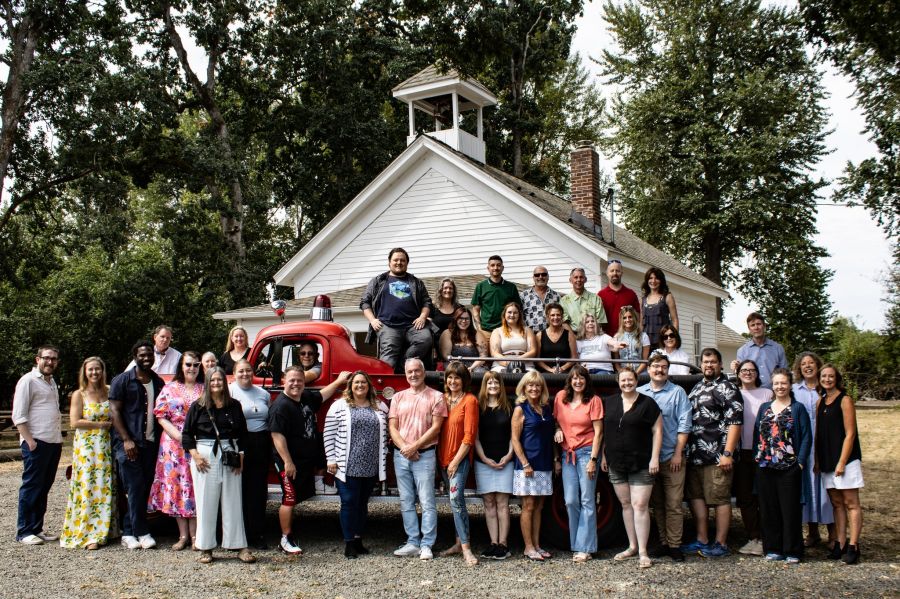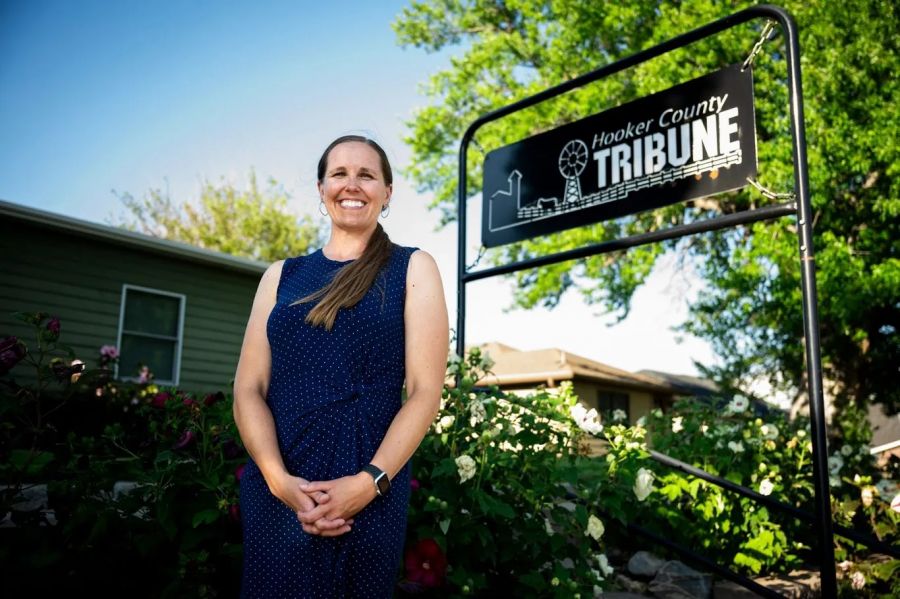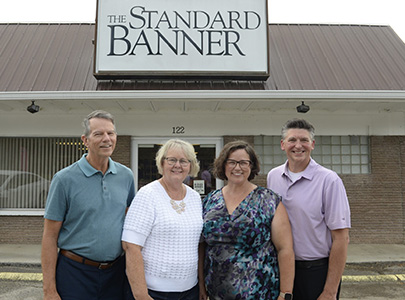Defying the odds
Teri Saylor
Special to Publishers' Auxiliary
Sep 1, 2025
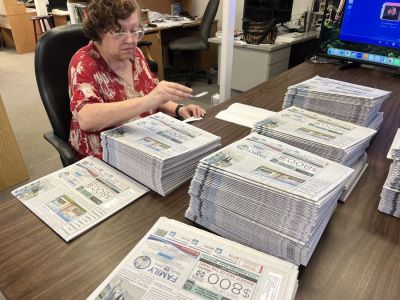
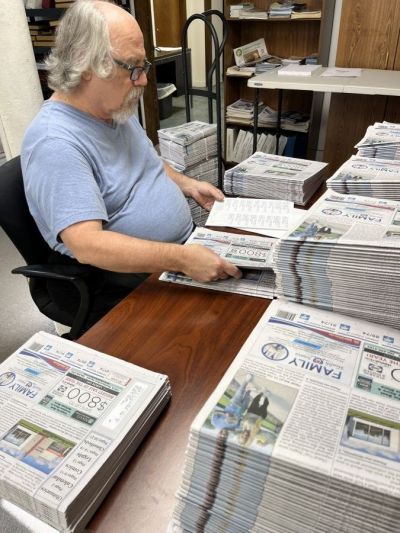
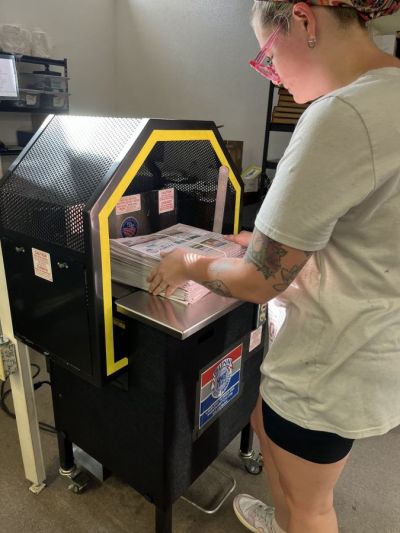
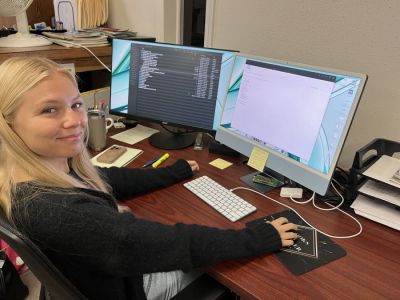
When Barb Shepherd, Eileen Everett and Joann Kramer launched a weekly newspaper in Florida, they were low on funding but rich in hopes and dreams; 30 years later, it’s going strong
Fiercely nimble, The West Volusia Beacon has never met an obstacle it couldn’t overcome.
It might have something to do with its owner and publisher Barb Shepherd, who started the newspaper with two colleagues in DeLand, Florida. Trading on youthful enthusiasm as currency and relying on nerve to just go for it, they cobbled together some funds and launched the paper in 1992.
Thirty-three years later, Shepherd retains the scrappy optimism that has enabled her to keep the newspaper going through industry changes while dipping and dodging the many challenges the universe has tossed into her path.
She’s never let the lack of money stop her, and her can-do attitude has never let her down. A couple of years ago, she gave up her salary so she could afford to hire a new reporter.
“I now make $200 a month, and I’m very proud of that,” she said in a recent Zoom interview.
Advertising sales have been as challenging for The West Volusia Beacon as for other newspapers across the country, and Shepherd admits the newspaper is beginning to feel the strain.
“We just got word this week that two of our four ad salespeople are leaving, so our No. 1 priority right now is beating the bushes and finding new advertising employees,” she says.
She’s exploring alternative staffing structures, including the hunter-farmer team approach and dividing her team into two groups — the hunters, who focus on acquiring new clients through prospecting and closing, and farmers, who specialize in nurturing existing client relationships to increase customer loyalty.
“We're very good at being creative, and if one idea doesn't work, we can just pivot and do something else,” she said.
GROWING UP IN KOKOMO
Shepherd’s resourcefulness might be traced back to her growing up days in Kokomo, Indiana. After dropping out of high school as a sophomore, she earned her diploma at night school as an adult. She attended Indiana University in Kokomo and earned 65 credit hours before her funding dried up.
“My Pell grants ran out, and my mom and dad had just recently split up, so I didn't finish college and just kind of went from there,” she said.
Shepherd and her husband, Jeff, decided in 1981 to head east and down to Florida to chase their dreams. She aspired to be a writer, and Jeff wanted to be a musician.
She landed a job doing paste-up at the now-defunct DeLand Sun News and joined the reporting team after writing a letter to the editor about legalizing marijuana, even though she wasn’t a smoker.
“The editor came into the paste-up room and asked me if I had written the letter, and I told him I sure did,” she recalled.
He offered her a reporting beat on the spot.
“And that's where it started,” she said.
LAUNCHING A NEWSPAPER
The Sun News eventually shut down after the Daytona Beach News Journal bought it. Shepherd freelanced a while and decided to start the West Volusia Beacon with her neighbor, Eileen Everett, who also had a journalism background.
“We were young moms with little kids,” Shepherd said. “We went to a few Small Business Administration seminars and then decided we could probably start a newspaper.”
Along the way, the duo found they were missing one key skill set — accounting.
“We didn’t know how to keep the books and had no idea how to do payroll taxes,” Shepherd said.
Joann Kramer had been the bookkeeper for the DeLand Sun News and then the Daytona Beach News Journal Company for many years.
“I was so ballsy,” Shepherd recalls. “I walked into the News Journal office on the pretense that I needed to check out something about my retirement account, and I told Joann that Eileen and I were going to start a local paper for West Volusia, and I asked her to come work for us.”
Turning the offer down flat, Kramer instead agreed to come on board as the third partner.
She has since sold her shares of The Beacon back to the other two owners and retired to Georgia. Everett, who retains her share of ownership, moved to Ohio and still sits on the newspaper’s board of directors.
Shepherd was on her way to retirement until last March, when the newspaper’s current accountant and general manager decided to leave the United States and moved his family to Albania.
Thanks to technology and the miracle of remote working, he’s stayed in his job, and the arrangement seems to be working despite the six-hour time difference. He had to drop most of his management duties though, forcing Shepherd to delay retiring.
“So, our CFO lives in Albania,” Shepherd said. “He can only work until 11 o' clock in the morning eastern time because that's dinner time over there.”
The West Volusia Beacon has 23 employees, and most of them work part time. Freelancers are available to step in when needed.
“We have absolutely wonderful, talented people who love the newspaper business, and that’s been the lifesaver,” she said and pointed to Al Everson, one of her lead reporters who is well into his 70s and covers local government.
“He’s our superhero,” she said.
INVESTING IN A COMMUNITY
In 2004, Shepherd, Kramer and Everett were seeking a new office building and bought an acre of land with some rundown buildings in the heart of downtown DeLand. They converted the whole block into an entertainment hub.
Today, Artisan Alley is a gathering space with shops, a restaurant, a brewery, offices and an event venue that hosts a farmers’ and makers’ market on Friday evenings.
“It was a ghost town and a dump, but we’ve restored it and brought it back to life, and it’s been a really good thing for downtown DeLand,” Shepherd said.
For the last 20 years, she has played a dual role as a property manager and newspaper publisher. She lives with her husband and cat in an apartment above the newspaper offices.
At one time, The West Volusia Beacon was published twice weekly, but after COVID-19, it dropped to once a week. Its paid circulation is 5,000, including 600 single–copy sales. A new venture into smart sampling has boosted its numbers to 7,000.
Shepherd recently launched “West Volusia Live,” a new monthly lifestyle publication, in hopes of boosting advertising and overall readership.
“We've got to keep preaching the importance of local journalism,” she said. “We're inevitably going to become digital someday, and I think we’re going to see more monthly magazines because people do like to have something to hold in their hands.”
Over the years, Shepherd has had to switch printers twice. She now contracts with The Villages Daily Sun, the newspaper that covers The Villages retirement community in Lakeland, Florida.
Because The Daily Sun doesn’t handle mailing, Shepherd and her newspaper crew have learned how to do it themselves.
“On Wednesdays, we all just pitch in and get it done,” she said. “That's quite an operation, but we save money, and the mailing is prepared correctly every week.”
NAVIGATING CHANGE
Producing the newspaper takes an entire week to accomplish, Shepherd says. It all starts with sending the newspaper to the printer on Monday night and receiving the printed copies back at the newspaper office on Wednesday where they’re sorted, bundled and driven to the post office to be mailed on Thursday. Subscribers receive them on Friday.
“The last time we have an opportunity to report on anything or place an ad is on Monday, and it takes five days for our subscribers to receive their newspapers,” Shepard said. “So we have to keep that in mind when we report news.”
The Beacon’s online presence is vibrant and updated constantly, so despite the print product’s lag time, readers can get fresh news whenever they go online. The Facebook page has over 19,000 engaged followers, and Shepherd is always on the lookout for ways to convert those followers into subscribers.
There was a time when a competing news operation nearby was a newspaper’s greatest threat, but today, local organizations and public entities can produce their own news. Even law enforcement is capable of upstaging local news outlets using taxpayer money to hire public relations professionals who use state-of-the art production equipment.
“It’s been a big revelation for us to realize local governments are going to have a professional staff making twice as much money as any of our journalists, so we have to go beyond simple coverage and report the whys,” she said. “We must remind the public that the sheriff or the local government are putting their own spin on their issues, and they may not be providing the whole story.”
These days, Shepherd, who is 68, yearns to retire, but she doesn’t have a succession plan. She had hoped her general manager would step in to run the newspaper.
“My succession plan moved to Albania,” she quipped.
She has in place a board of directors made up of friends, colleagues and people in her community who help guide the newspaper and provide advice and perspective. She hopes they will help her transition out and provide for the future of The West Volusia Beacon. She has no plans to sell it, and even in retirement, she will continue to serve as president.
Shepherd remembers what it was like in the early 1990s when she was a young, idealistic journalist keen on starting a scrappy local newspaper. As the years have passed, she’s seen a news environment that has become seasoned and weatherworn. Nevertheless, local news still serves an important purpose.
“When we started the newspaper, it was like a honeymoon, and people just couldn't advertise or subscribe fast enough, and it was wonderful,” she said. “Our newspaper has evolved, but we still reflect our community’s identity, we unite people, and we are still important to West Volusia.”
Teri Saylor is a freelance writer in Raleigh, North Carolina. Contact her at terisaylor@hotmail.com.


